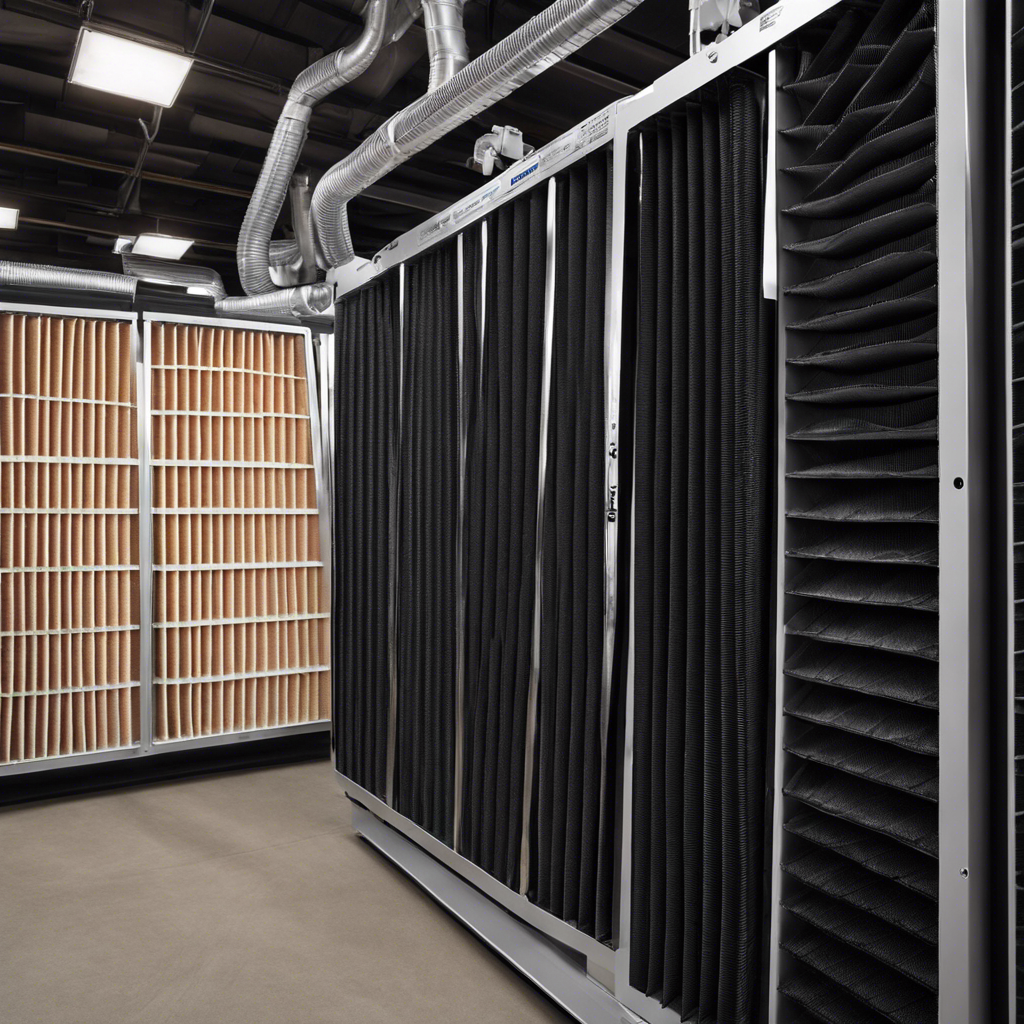If you’re looking to enhance the quality of the air circulating in your Tulsa home, you might want to consider exploring the various types of HVAC filters available.
These filters can make a significant difference in the air you breathe, without you even realizing it.
From fiberglass filters to pleated filters, electrostatic filters to HEPA filters, and even activated carbon filters, each option offers its own unique set of benefits.
And as you continue on this journey of HVAC filter exploration, you’ll discover just how vital they are in maintaining a healthier living environment.
So, let’s dive in and uncover the secrets behind these different types of filters, shall we?
Key Takeaways
- Fiberglass HVAC filters are a cost-effective option that efficiently remove dust, pollen, and allergens from the air. Regular maintenance is crucial for optimal performance.
- Pleated HVAC filters have a larger surface area and can effectively trap a wide range of pollutants, including dust, pollen, and pet dander. Look for filters with a high MERV rating and consider the size for proper fit.
- Electrostatic HVAC filters use static electricity to capture airborne particles, such as pollen, pet dander, and mold spores. They help reduce odors and improve indoor air quality but require regular cleaning.
- HEPA filters are an excellent choice for individuals with allergies or respiratory conditions. They can trap particles as small as 0.3 microns and require regular maintenance. Activated carbon filters target specific pollutants and provide odor control, making them beneficial for households with pets, smokers, or respiratory sensitivities. They work alongside other HVAC filters for comprehensive air purification.
Fiberglass HVAC Filters
Fiberglass HVAC filters are commonly used in residential and commercial HVAC systems to improve air quality by trapping airborne particles.
These filters have several advantages over other types of filters. First, fiberglass filters are cost-effective, making them an affordable option for homeowners and businesses. They’re also highly efficient at removing dust, pollen, and other allergens from the air, improving the overall indoor air quality.
Proper maintenance of fiberglass filters is essential for optimal performance. Regularly inspect the filter for any visible dirt or damage and replace it when necessary. It’s recommended to change the filter every 30 to 90 days, depending on the level of pollutants in the environment.
Pleated HVAC Filters
Pleated HVAC filters offer a highly effective solution for improving air quality in residential and commercial HVAC systems. These filters are designed with a larger surface area than standard filters, allowing them to capture more airborne particles and contaminants. One of the main benefits of pleated filters is their ability to trap a wide range of pollutants, such as dust, pollen, pet dander, and mold spores. This can greatly reduce the presence of allergens and improve the overall air quality in your space.
When choosing pleated filters for better air quality, there are a few considerations to keep in mind. First, look for filters with a high Minimum Efficiency Reporting Value (MERV) rating, as this indicates their ability to filter smaller particles. Additionally, consider the size and dimensions of the filter to ensure a proper fit in your HVAC system.
Electrostatic HVAC Filters
If you’re looking for another effective option to improve air quality in your HVAC system, consider electrostatic HVAC filters. These filters are designed to capture airborne particles by using static electricity.
The benefits of electrostatic HVAC filters include their ability to trap smaller particles than standard filters, such as pollen, pet dander, and mold spores. They can also help reduce odors and improve overall indoor air quality.
However, there are some drawbacks to consider. Electrostatic filters require regular cleaning to maintain their effectiveness, and they may not be as efficient at capturing larger particles. It’s important to follow proper maintenance tips for electrostatic HVAC filters, such as washing them regularly or replacing them when necessary.
High-Efficiency Particulate Air (HEPA) Filters
One option to consider for improving air quality in your HVAC system is the use of high-efficiency particulate air (HEPA) filters.
HEPA filters are known for their ability to trap and remove tiny particles from the air, making them an excellent choice for individuals with allergies, asthma, or other respiratory conditions.
These filters are designed to capture particles as small as 0.3 microns, including dust, pollen, pet dander, mold spores, and even bacteria and viruses.
By removing these pollutants from the air, HEPA filters can help create a cleaner and healthier indoor environment for you and your family.
To maintain the effectiveness of HEPA filters, regular maintenance is necessary.
This includes checking and replacing the filters as recommended by the manufacturer, typically every 6 to 12 months.
With proper care, HEPA filters can provide long-lasting benefits and contribute to better air quality in your home or office.
Activated Carbon HVAC Filters
To further enhance the air quality in your HVAC system, another option to consider is the use of activated carbon filters. These filters are designed to target specific indoor air pollutants and provide effective odor control.
Activated carbon is a highly porous material that has the ability to adsorb various gases, chemicals, and volatile organic compounds (VOCs) present in the air. When air passes through the activated carbon filter, these pollutants are trapped within the carbon’s pores, preventing them from recirculating in your home.
This filtration method is especially beneficial for households with pets, smokers, or individuals with respiratory sensitivities. Activated carbon filters work alongside other HVAC filters to provide comprehensive air purification, ensuring that you and your family breathe clean, fresh air indoors.
Frequently Asked Questions
How Often Should I Replace a Fiberglass HVAC Filter?
You should replace a fiberglass HVAC filter every 30-60 days for optimal filter maintenance. Regular filter replacement ensures better air quality by trapping and removing dust, allergens, and other particles from your home’s air supply.
Can Pleated HVAC Filters Help Reduce Allergens in the Air?
Yes, pleated HVAC filters can help reduce allergens in the air. They have a higher MERV rating compared to fiberglass filters, which means they can capture smaller particles like dust, pollen, and pet dander.
Are Electrostatic HVAC Filters More Effective in Capturing Smaller Particles?
Yes, electrostatic HVAC filters are more effective in capturing smaller particles. The efficiency of electrostatic filters lies in their ability to attract and trap even the tiniest airborne contaminants, ensuring better air quality for you.
What Is the Lifespan of a High-Efficiency Particulate Air (Hepa) Filter?
A HEPA filter typically has a lifespan of about 6 to 12 months, depending on usage and air quality. These filters are highly efficient in trapping microscopic particles, improving indoor air quality and promoting healthier living environments.
How Does an Activated Carbon HVAC Filter Help in Reducing Odors in the Air?
Activated carbon HVAC filters are effective in reducing odors in the air. The benefits of using activated carbon filters include their ability to absorb and trap volatile organic compounds, chemicals, and other pollutants that cause unpleasant odors.


